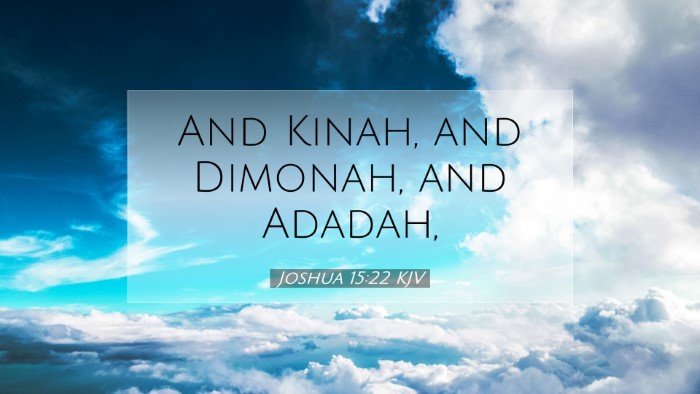Commentary on Joshua 15:22
Joshua 15:22 states: "And Kadesh, and Hazor, and Iethnan,"
This verse is part of the larger context of the division of the land among the tribes of Israel. It mentions specific locations that are significant within the narrative of the Israelites' conquest of Canaan. Below is a summarization of insights gathered from public domain commentaries.
Contextual Overview
In the Book of Joshua, we witness the Israelites as they settle into the land promised to them by God. This particular verse occurs within the allocation of territory to the tribe of Judah. Understanding this context is crucial for appreciating the significance of the locations mentioned.
Significance of Kadesh
Kadesh is mentioned several times in the Scriptures. It serves as a landmark in Israel's wilderness wanderings. Matthew Henry discusses it as a place of refreshing, pointing out its importance as a water source for the Israelites during their travels.
- Historical Importance: Kadesh was the site from which the spies were sent to scout the land of Canaan (Numbers 13).
- Spiritual Implications: It symbolizes both testing and the consequences of disobedience, as it was here that the Israelites’ lack of faith led to their prolonged wandering.
Importance of Hazor
Hazor is referred to often in biblical texts and was notably conquered by Joshua. Albert Barnes highlights Hazor as a representative of the strongholds of the Canaanites, which had to be subdued to establish the Israelites' claim to the land.
- Military Significance: Hazor was a significant city during the military campaigns and represents the strategic cities that needed to fall for Israel to achieve dominion (Joshua 11:10).
- Cultural Relevance: As a center of Canaanite culture, its conquest symbolized a victory over false gods and practices, establishing God’s sovereignty over the land He promised to Israel.
Insights on Iethnan
Iethnan is less discussed compared to Kadesh and Hazor, making it a point of curiosity. Adam Clarke provides insights regarding its potential location and role as a boundary marker within the tribal inheritance.
- Geographical Significance: Iethnan may have had boundaries or agricultural advantages that made it notable in terms of settlement distribution (some sources suggest it relates to fertile areas).
- Theological Reflection: Its inclusion in this list reiterates God's promise to provide the land and territories not only as geographic areas but also as places where His covenant with Israel would manifest.
Theological Implications
The mention of these places exemplifies God's faithfulness in fulfilling his promises. Each site carries its history and significance, leading to a deeper understanding of the nation of Israel’s identity as they occupied Canaan.
- God's Sovereignty: Each city’s conquest demonstrates God's control over nations and the fulfillment of His covenant.
- Factional Unity: The careful notation of these territories emphasizes the importance of community and territorial inheritance as part of Israel’s identity.
- Hope and Restoration: For the post-exilic community, reflecting on these conquests provided hope and a reminder of God's enduring promise
Concluding Thoughts
Joshua 15:22, though concise and seemingly a simple listing of geographical names, opens a dialogue into the historical and theological richness of the biblical narrative. It serves as a reminder for believers today about God’s faithfulness in leading His people and the importance of the land that carries the story of divine providence and human response.
Pastors, students, theologians, and scholars can derive significant application from these reflections as they explore both the narratives and theological implications packaged within these historic references.


